We're all familiar with the rule-based chatbots of the past that frustrated customers by keeping them in a loop of providing the wrong answer and refusing to send them to a human customer support agent. This has left many customer support teams wondering: Are today's AI ticketing systems just more of the same, or are they actually worth considering?
In this guide, we're going to answer that question. We'll take a look at how today's AI ticketing systems are different from the rule-based automations of the past, explore some of the ways they can help you deliver better and faster customer support, and review the seven best AI ticketing systems on the market in 2025.
What is an AI ticketing system?
An AI ticketing system is a help desk that leverages technologies like machine learning and natural language processing to automate tasks like responding to, resolving, routing, escalating, and prioritizing customer support tickets.
How do AI ticketing systems work?
Advances in machine learning and natural language processing have made today's AI ticketing systems much more sophisticated than the rule-based workflows and chatbots of the past.
Unlike rule-based systems, AI ticketing systems use machine learning to continuously improve and adapt based on data. Most are trained on your knowledge base content and responses to customer support inquiries to increase the likelihood that the answers they provide are correct. They may also use feedback to continually refine the actions they take and responses they provide.
AI ticketing systems also use natural language processing to understand requests in a way that’s similar to a human. Instead of triggering replies based on specific keywords or relying on answers provided in intake forms, they can extract the meaning from a query written in natural language and reply in a conversational way, such as asking follow-up questions when needed.
What can today's AI ticketing systems do?
There are several ways that AI ticketing systems help support teams deliver better, faster support.
Reply to customer inquiries: AI ticketing systems can automatically reply to inquiries received across a variety of channels — email, chat, social, and even phone. Because they're trained on your data — knowledge base articles, replies to historical requests, your website, and more — the answers they provide are accurate.
Write draft replies to requests: If you don't want to fully hand the reins off to AI to do support for you, AI ticketing systems can also draft replies for you. Agents can then review those drafts, hit send if they're correct, and edit them if they're not quite right, which can save your team a lot of time and help you close support tickets more quickly.
Update information in other systems: If you connect your ticketing software to other tools you use — such as your ecommerce platform, billing system, or CRM — AI agents can also perform simple system actions like canceling orders, providing tracking information, issuing refunds, or updating customer data.
Perform translations and edit replies: AI can translate customer inquiries from one language into another so your agents can understand them and then translate their replies back into the original language so the customer can understand it. They can also help you copy edit replies, adjust tone and sentiment, and shorten or expand responses.
Summarize information: AI can write summaries of long, back-and-forth exchanges and attach those summaries to support tickets so that agents picking up a complicated ticket can get up to speed quickly without having to read through the entire conversation history.
Route, prioritize, and escalate tickets: AI can automatically route support tickets to the right team/agent based on things like skillsets, availability, and subject-matter expertise. It can also perform sentiment analysis, identify customer attributes, and analyze request details to prioritize, categorize, and/or escalate tickets.
Gather insights, identify trends, and uncover issues: Some AI ticketing systems come with reporting features that do things like measure customer satisfaction even when a CSAT survey wasn't completed, identify agents that are providing unhelpful or unclear responses, and uncover self-service articles that are outdated or incorrect.
Create new knowledge base articles: Some AI ticketing systems have features that let you instantly turn a customer support conversation into a knowledge base article. Others let you provide an outline or a few bullet points, then they transform that input into a complete knowledge base article instantly.
Help your agents reply to inquiries: Many AI ticketing systems come with copilots that provide your agents with assistance while they're doing their work, such as recommending relevant help center articles, suggesting saved replies that could be used, or surfacing recently closed requests that might contain the information they need.
What are the benefits of using an AI ticketing system?
The capabilities of AI ticketing systems that we covered above deliver four major benefits to customer support teams.
Faster response times: AI ticketing systems improve response times by automatically answering questions, suggesting answers for reps, offering writing assistance, summarizing conversations, and getting requests to the right team/agent immediately.
Less strain on human reps: Repetitive tasks like sorting and assigning tickets, providing order updates, and answering FAQs can be a drain on human agents. Using AI for ticket management makes agents' jobs more enjoyable and gives them more time to focus on the types of work that only a human can do.
Higher customer satisfaction: Faster response times and access to more robust self-service tools like AI chatbots can improve the overall customer experience of interacting with support, leading to more satisfied customers.
Reduced operational costs: By automating repetitive tasks and responding to simple customer issues across multiple channels, you can deliver high-quality customer service with fewer support agents. This can lead to significant cost savings.
The 7 best AI ticketing systems
The best AI ticketing systems are Help Scout, Freshdesk, Intercom, Zendesk, Salesforce Service Cloud, SysAid, and Tidio. Below, we've listed what AI features each platform offers, highlighted what types of use cases they're best for, and explained how their pricing works.
1. Help Scout – Best AI ticketing system for gradual AI adoption
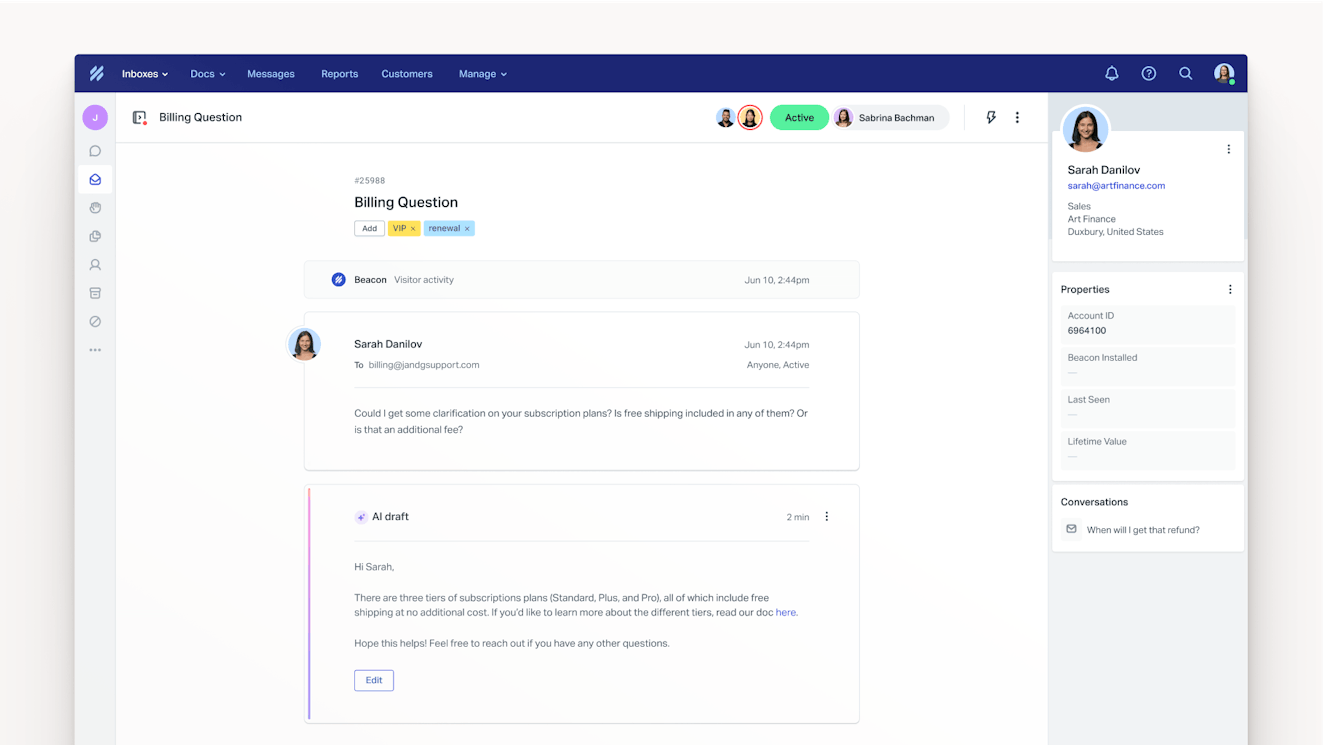
If your goal for adopting an AI ticketing system is to automate everything and replace your entire support team with AI agents, Help Scout isn't the right solution for you. However, if you want to gradually add AI into your support mix as a means of improving the customer experience and creating opportunities for your agents to do more engaging and fulfilling work, it's perfect.
When you sign up for Help Scout, you get access to email, self-service, chat, and social support — all managed in a shared inbox. You can build private and public knowledge bases, serve proactive messages to app users and website visitors, integrate with Shopify, conduct NPS and CSAT surveys, use AI to deliver better, faster support, and much more.
Help Scout's AI features are trained on your data — help center articles, previous replies to customers, and even your websites — to ensure that anything it produces is both accurate and on brand.
AI features
Answer visitor and customer queries automatically via chat.
Write draft replies to email inquiries that can be reviewed before they're sent.
Summarize long conversation threads to get up to speed quickly.
Shorten or lengthen replies, change the tone of a reply, or check grammar and spelling.
Translate requests and replies into different languages.
Pricing
Free plan and trial available. View Help Scout's current pricing.
Learn more about Help Scout:
2. Freshdesk + Freshcaller – Best AI ticketing system for phone support
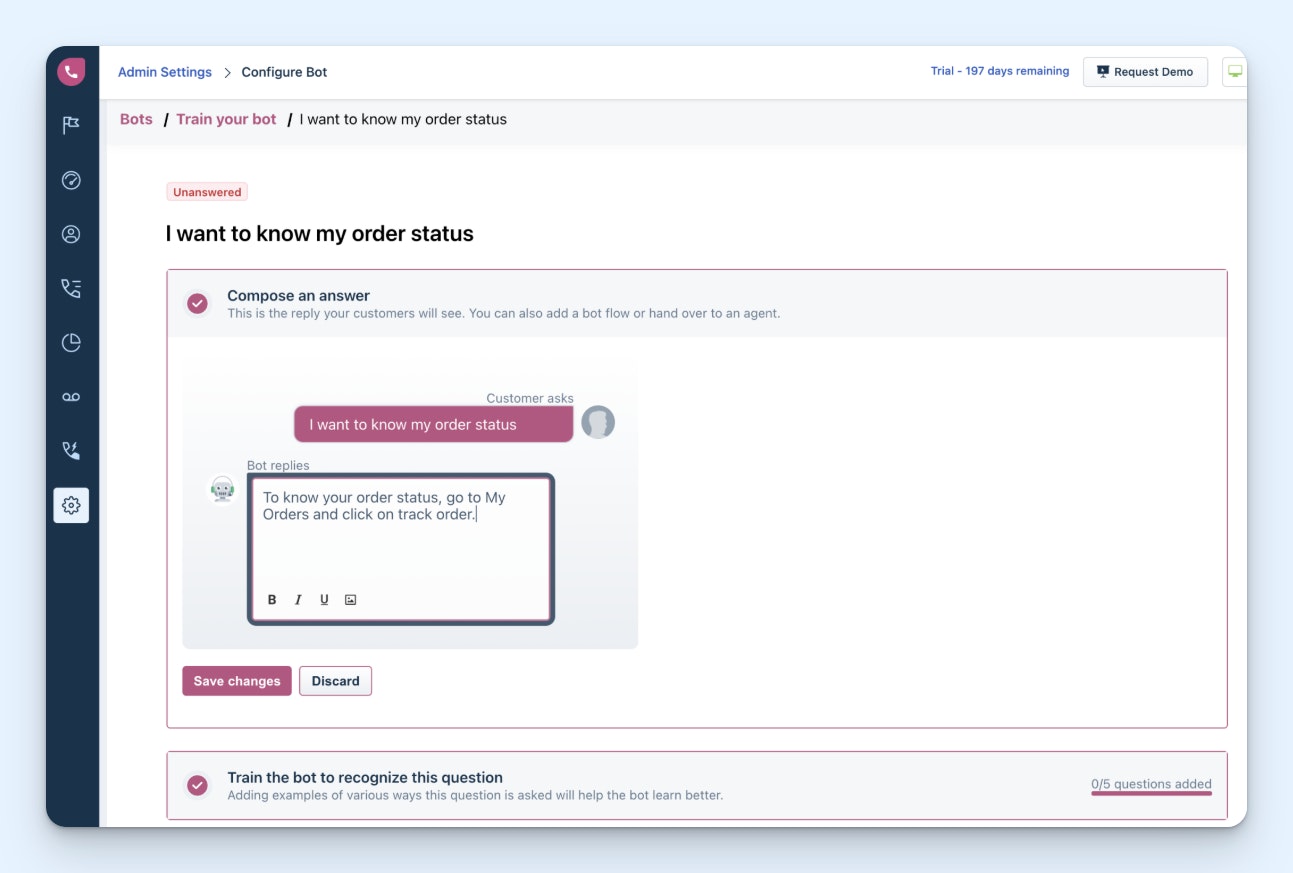
Freshdesk is Freshworks' help desk software. It lets you manage support across multiple channels — email, social, chat, and self-service — as well as build customer portals or launch community forums. Its AI can automatically answer email and chat questions, help agents find resources that help them write replies, and give managers insights into team performance.
When combined with Freshworks' call center software, Freshcaller, customer service teams can even use AI to answer customer questions over the phone. The phone AI is a bit more rule-based — you have to provide it with example questions and answers for it to work properly — but it's a great way to save time if your team spends a lot of time answering FAQs over the phone.
AI features
Automatically reply to customer requests over email, chat, and phone.
Write draft replies to inquiries for agents.
Summarize conversations, translate requests/replies, and check grammar and spelling.
Use AI-powered sentiment analysis to prioritize tickets from customers who are unhappy.
Provide feedback to agents while they're writing a reply and after they're responded.
Get performance insights and recommendations for how to improve.
Pricing
Free plan and trial available. View current pricing for Freshdesk and Freshcaller.
3. Intercom – Best for AI ticketing system for performance analysis
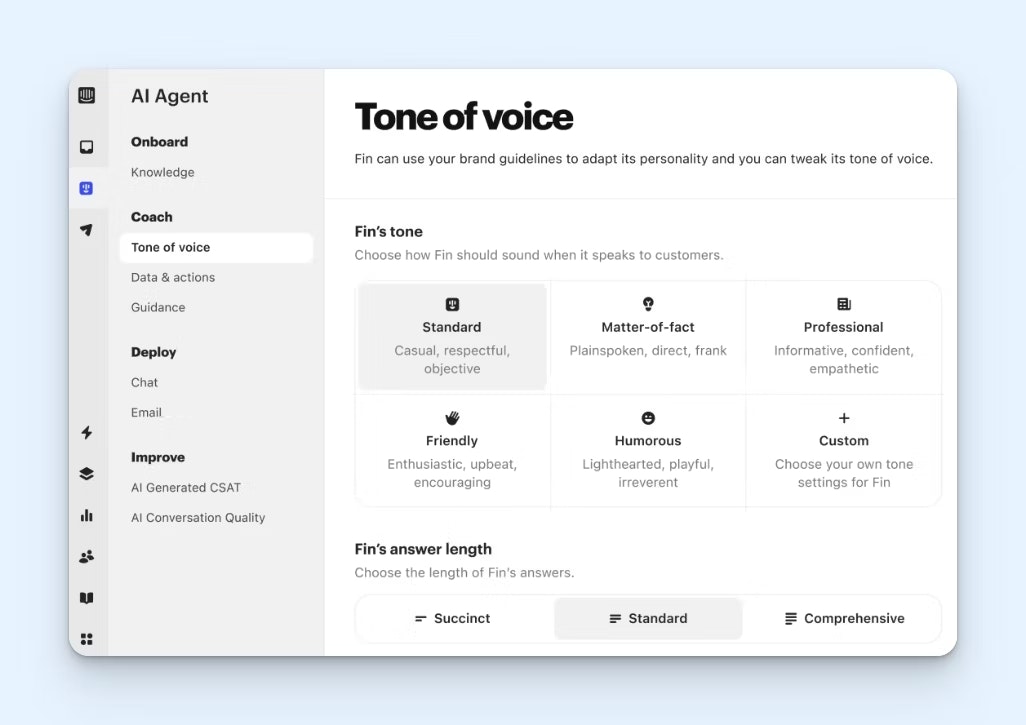
Like the other platforms on this list, Intercom's AI will answer customers' questions for you and help your agents draft replies. But it also offers some unique features you won't find in all of the tools. For example, you can find training opportunities by using AI to measure customer satisfaction or access reports that list replies the AI believes weren't helpful.
As a support platform, Intercom's help desk has native features for all support channels — email, chat, self-service, social, SMS, and phone. You can also integrate it with third-party platforms like Slack, WhatsApp, Shopify, Stripe, Salesforce, and HubSpot.
AI features
Send automated responses to questions over email, chat, WhatsApp, SMS, and social.
Triage, route, and reply to tickets based on rule-based workflows.
Access data from third-party sources to personalize AI-generated responses.
Deliver different answers to different customers based on specific attributes.
View AI-generated customer satisfaction scores for all customer interactions.
Review a list of support interactions that AI believes were unhelpful.
Access a list of unsolved questions to see where your training data has gaps.
Pricing
Free trial available. View Intercom's current pricing.
4. Zendesk – Best AI ticketing system for knowledge base optimization
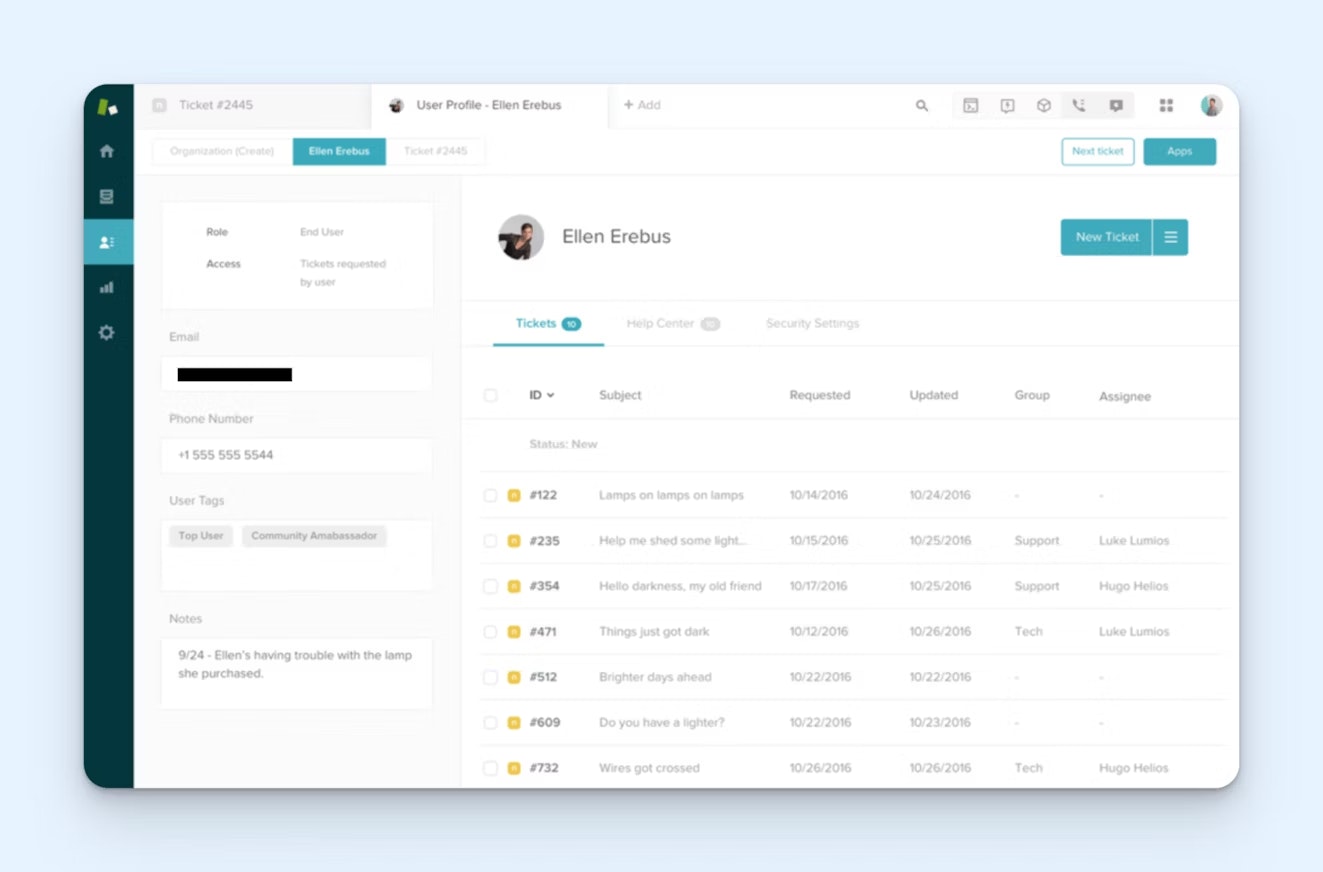
Zendesk is an enterprise-focused ticket management platform with every feature customer service teams could ever possibly need. It gives you tools to deliver support across all channels, lets you create client portals and community forums, integrates with nearly 2,000 different platforms, and even lets you create custom apps and workflows using Zendesk Sunshine™.
As far as its AI features, Zendesk offers a similar feature set as the other tools we've looked at with one exception — it comes with tools to help you improve your knowledge base. Use AI to identify gaps in coverage in your help center, then write a few bullet points specifying what should be covered and let AI transform it into an entire knowledge base article for you.
AI features
Automatically reply to customer conversations over email, chat, and social.
Create different bot personas to reply to different types of queries.
Use copilot to recommend replies to agents or adjust the tone or length of replies.
Enable ticket management and ticket routing based on rule-based workflows.
Detect issues in replies and provide coaching to agents across all channels.
Automatically create optimized agent work schedules.
Pricing
Free trial available. View Zendesk's current pricing.
5. Salesforce Service Cloud – Best AI ticketing system for enterprise companies
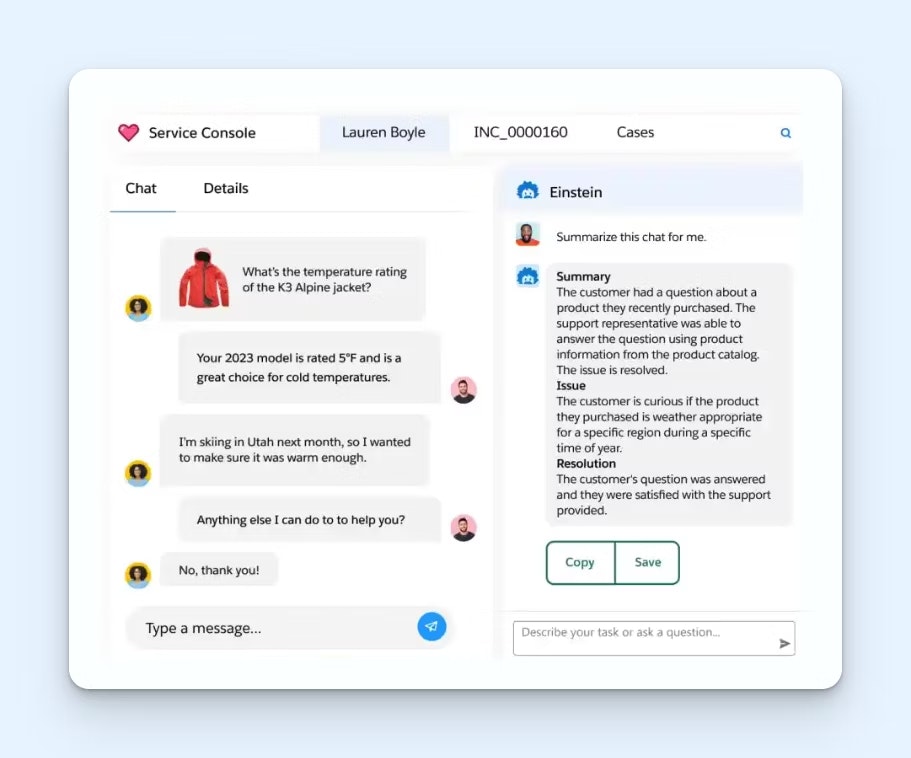
Salesforce Service Cloud is built (and priced) for enterprises, but it has the most advanced AI capabilities of all of the apps on this list.
In addition to being able to understand text that customers send in with their support requests, it can also process and understand pictures, videos, and audio files. Service Cloud can also transform support conversations into knowledge base articles in a click, making it easy to fill gaps in your help center without having to write articles from scratch.
AI agent conversations in Salesforce Service Cloud are also highly secure due to Salesforce's Einstein Trust Layer, which uses features like dynamic grounding, zero data retention, and toxicity detection to protect the privacy and security of your data.
AI features
Answer customer questions in your help center or via SMS or messaging channels.
Draft replies for agents or suggest relevant help center articles to reference.
Create step-by-step plans for agents explaining how to solve cases.
Route, categorize, and assign tickets based on skills, availability, and historical performance.
Summarize long conversation threads.
Translate support requests and replies into other languages.
Transform support team replies into knowledge base articles.
Pricing
Free trial available. View Salesforce Service Cloud's current pricing.
6. SysAid – Best AI-powered IT ticketing system
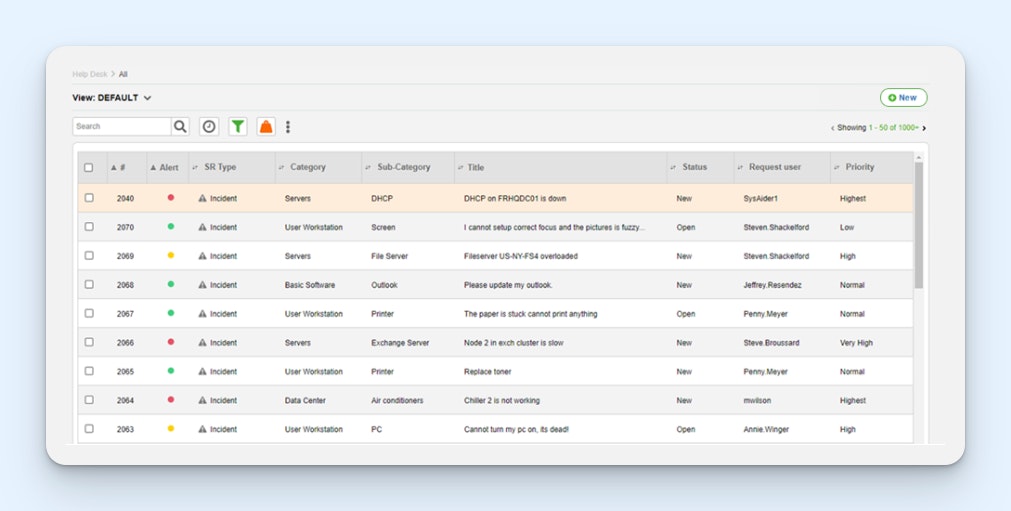
SysAid is a great service desk ticketing system for teams that are more focused on technical support. In addition to ticketing software, it comes with request, change, and problem management features; gives you tools to manage company assets; and lets you set custom SLAs.
SysAid's Copilot lets both agents and end users take advantage of the system's AI capabilities. Like Salesforce's AI, SysAid's AI agents can understand and process images, so it can do things like diagnose why a user is having issues based on an error message shared in a screenshot or determine if an email is a phishing attempt or not based on a screenshot of it.
AI features
Draft answers to questions that agents can review and send.
Pull important details about assets that are related to a query.
Automatically detect incidents and issues.
Create ticket summaries.
Categorize tickets, prioritize them, and route them to the right agent/department.
Deliver instant answers via email, the chatbot widget, or in Microsoft Teams.
Process images that end users share, and use that data to understand issues.
Pricing
No free trial offered. Contact SysAid for pricing.
7. Tidio – Best for AI skeptics
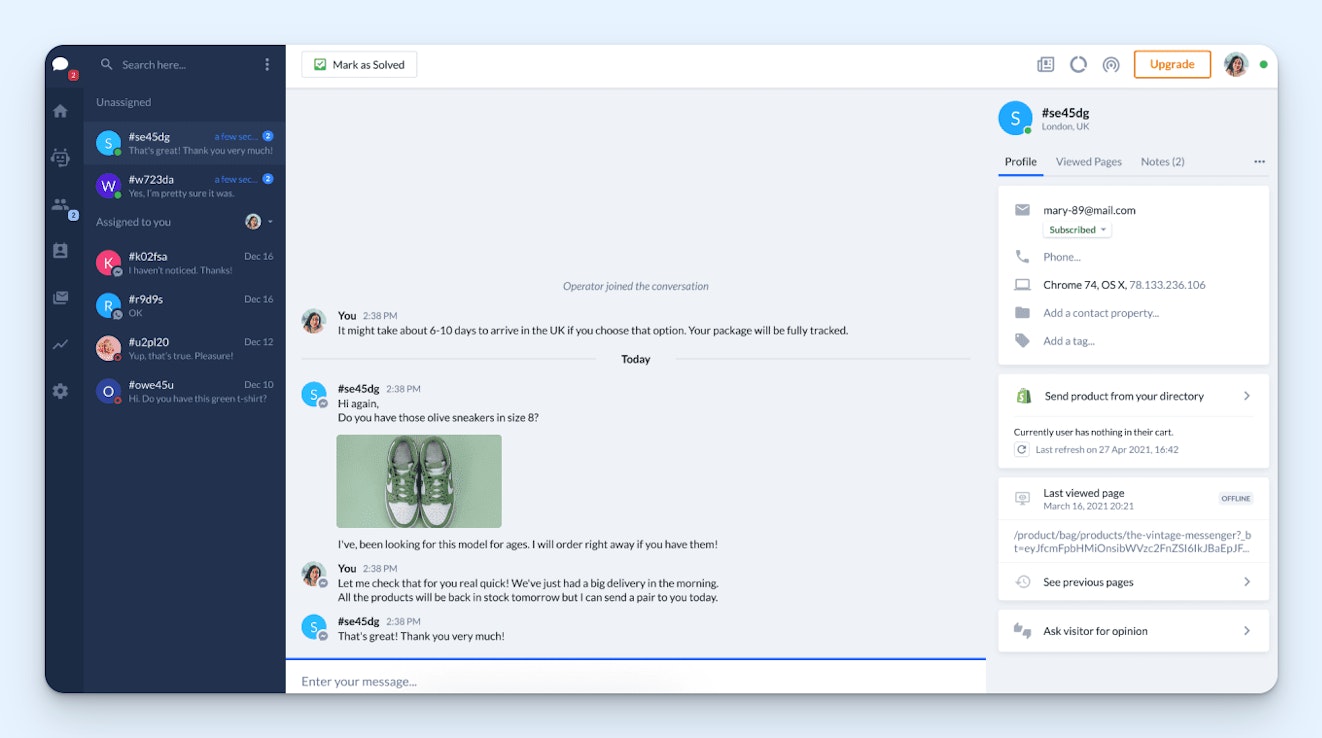
If you're still feeling skeptical about AI's ability to deliver the same level of support that a human would and want to try it out in a low-risk way, Tidio is a good AI system to consider. It lets you monitor the conversations AI is having with customers in real time so you can keep an eye on what it's doing and jump in if things start to go south.
You can train their conversational AI, Lyro, on different knowledge sources like an FAQ page or your website, and it can automate all sorts of tasks such as checking order statuses and answering basic questions. For more complex situations, you can use Tidio’s Flows feature to build chatbot flows manually.
AI features
Answer customer questions automatically over live chat.
Recommend products to customers based on your Shopify inventory.
Check order statuses and provide updates to customers.
Pricing
Free trial available. View Tidio's current pricing.
Tips for implementing AI ticketing systems
Choosing the AI ticketing system you'll use is only half the battle. Once you have the system in place, follow these tips for a successful implementation.
Talk to your team
A good portion of the news about AI is how it's going to take everyone's jobs, so it's natural if your customer service agents feel a little anxious about you implementing it into your support process. Taking time to talk to them about your goals for AI before you start implementing can ease their anxiety and get them more excited about helping you get it tested and launched.
We have several posts you can read and share with your team on this topic:
Clean up your training data
Some AI-powered ticketing systems let you choose the specific assets the AI is trained on. Others will simply crawl your knowledge base, historical ticket data, and website to build knowledge.
If your system is in the latter group, it's important to take time up front to make sure that the information in these systems is accurate and up to date. Otherwise, you'll end up with an AI that's poorly trained on inaccurate data.
Start small
While it might be tempting to immediately take advantage of all of the new AI features you have available to you, doing so will make the process more time-consuming and error-prone.
Instead, choose one area you want to focus on — maybe one related to a specific challenge your team is having — and focus on launching and refining the AI for that specific use case.
For example, let's say you want to improve your time to resolution. A good place to start might be to have AI write draft replies to service requests for your agents. This will help you get replies back to customers faster while also allowing you to monitor the accuracy of the AI's responses.
Once you get to the point where you feel like the AI is writing drafts that are good enough to send without editing, you can think about launching it as an AI agent to answer customers' questions on its own.
Test thoroughly
If the feature you want to take advantage of first is having AI reply directly to customers, make sure you do rigorous testing before launching it to make sure that it interprets customers' questions correctly and provides accurate answers. Otherwise, you run the risk of negatively impacting the customer experience.
If you're using it for ticket routing, send several test queries to make sure requests end up in the right place.
You'll also need to work with your security team to do some testing to make sure that the AI never shares protected data. If you have it set up where it can make changes in your system for you (such as updating orders or changing shipping addresses), you'll want to make sure it has a system for validating that someone who's writing in is who they claim to be.
By following these tips, you can increase your chances of successfully implementing AI into your support process in a way that saves your team time and improves the customer experience.
Should you add AI into your support mix?
AI may have exploded onto the scene, but it doesn’t seem like it’ll be a flash in the pan. Though there are limitations to its capabilities, there’s no denying that AI is now at a place where it can provide real value to support professionals while improving the customer experience.
The best way to determine if AI will be a valuable addition to your support arsenal is to try it out and see how it works for you. Knowing which tools offer the features you think you might want is a good starting point, but the real "aha!" moment is actually seeing AI do things that will save your support team time and let them focus their efforts on more engaging, interesting work.









